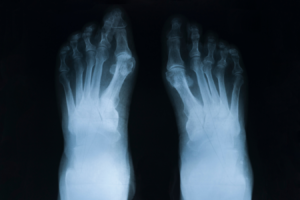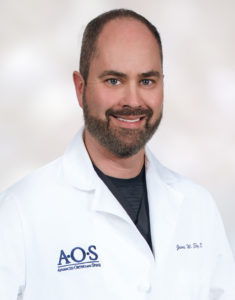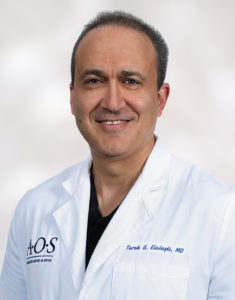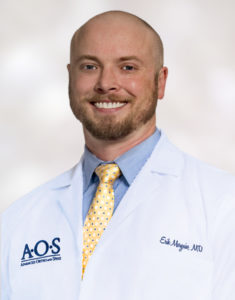Arthritis is a common condition that impacts a person’s joints. It can cause a range of pain, inflammation, stiffness, and more. Additionally, the disorder may make it difficult for a person to move or remain active.
There are more than 100 different kinds of arthritis. Read on to learn about some of the most common types we treat. Additionally, we’ll discuss their causes, symptoms, treatments, and more.
 What is osteoarthritis?
What is osteoarthritis?
Osteoarthritis is the most common type of arthritis. This condition can impact any joint. However, it most commonly affects joints in the hands, knees, hips, and spine. Osteoarthritis occurs when the protective cartilage between bones wears down over time. Consequently, the joint’s surface can become rough and irregular. This often causes pain along with a grinding sensation referred to as “crepitation”. At its most severe, osteoarthritis can cause the cartilage to completely wear away and lead to bone-on-bone changes. Typically, osteoarthritis occurs in those aged 50-plus since it is caused by physical wear and tear on the joints.
Thankfully, most mild to moderate osteoarthritis symptoms can be managed nonsurgically with proper treatment. Treatment options for mild cases of osteoarthritis include anti-inflammatory medication, physical therapy, and activity modification. Furthermore, moderate osteoarthritis may require the use of a brace or injections. Common injections include cortisone injections and gel injections (hyaluronic acid). Currently, hyaluronic acid injections are insurance-approved for the knee and shoulder.
However, if the osteoarthritis is late-stage (bone-on-bone), it may require surgery. Surgical treatments for osteoarthritis can include joint replacement surgery or fusion (arthrodesis) of the joint.
 What is post-traumatic arthritis (PTA)?
What is post-traumatic arthritis (PTA)?
Post-traumatic arthritis (PTA) is a form of osteoarthritis caused by a preceding injury or repetitive microtrauma. For example, an injury caused by a car accident or a repeated sports injury can lead to PTA. Symptoms of PTA often include pain, swelling, fluid buildup around the joint, and stiffness. Although PTA can impact any joint, it is particularly common in the foot and ankle. Additionally, patients with PTA are often younger and more active than typical patients with osteoarthritis.
As with other types of osteoarthritis, most PTA cases are manageable with conservative treatment. This may include anti-inflammatory medication, supplemental glucosamine, physical therapy, activity modification, and/or weight management. However, more severe cases of PTA may require surgery. That said, the type of surgery depends on the affected joint and the extent of the damage. For example, severe post-traumatic knee arthritis may be treated with a knee replacement.
 What is inflammatory arthritis?
What is inflammatory arthritis?
Inflammatory arthritis describes a group of chronic autoimmune diseases that often result in joint destruction. Essentially, this condition causes a person’s body to mistake its own tissues for harmful germs or pathogens and attacks them. As a result, the affected tissues and areas surrounding the joints become inflamed. Symptoms of inflammatory arthritis may include pain and swelling of the affected joints, stiffness, warmth, and even the occasional fever. Often, inflammatory arthritis affects many joints at the same time. It may impact specific joints more frequently depending on the underlying disease.
Inflammatory arthritis is a chronic disease. Therefore, it impacts patients of all ages. Additionally, inflammatory arthritis is more common in females than males, though the cause is unknown. Common types of inflammatory arthritis include:
- Rheumatoid arthritis
- Psoriatic arthritis
- Lupus
- Lyme disease
- Gout and pseudogout
- Ankylosing spondylitis
Many of the same nonsurgical treatment options for osteoarthritis are used for inflammatory arthritis. However, inflammatory arthritis patients often require additional medication to manage their specific underlying disease. For example, disease-modifying anti-rheumatic drugs (DMARDS) may help slow the progression of the disease and joint damage. Typically, a rheumatologist leads a patient’s care management for inflammatory arthritis. However, they will often also work with an orthopaedic surgeon to help treat the patient’s pain caused by the destructive changes in their joints.
When should I talk to a doctor?
There are several different kinds of arthritis. Treating each specific type correctly is paramount. Therefore, if you think you may have arthritis, it’s important to work with a doctor to determine which type you might have. Remember, any condition may worsen and lead to additional complications if left untreated. If you notice your symptoms negatively impact your life, consult a specialist as soon as possible. This will help to ensure you receive a proper diagnosis and treatment plan.
AOS can help.
At Advanced Ortho and Spine (AOS), we have over 100 years of combined experience, as well as extensive knowledge and expertise in treating a wide range of orthopedic conditions, including various types of arthritis. Each of our physicians, including Dr. Christopher Cook, Dr. James Eby, Dr. Tarek Elalayli, Dr. Erik Maryniw, Dr. Mitul Patel, Dr. Lee Swiderek, and Dr. Daniel Hagaman specialize in a variety of orthopaedic treatments and procedures. We always focus on conservative, minimally invasive treatment first before surgery is considered.
Request an appointment online or call us at 615.885.0200 to schedule yours today.
 Dr. Christopher Cook is a Board-Certified Orthopaedic Surgeon and Sports Medicine & Joint Replacement Specialist at Advanced Ortho and Spine. He provides a full spectrum of Joint Replacement, Sports Medicine, and Shoulder & Upper Extremity services. Contact us today for more information or to request an appointment. Contact us today for more information or to request an appointment.
Dr. Christopher Cook is a Board-Certified Orthopaedic Surgeon and Sports Medicine & Joint Replacement Specialist at Advanced Ortho and Spine. He provides a full spectrum of Joint Replacement, Sports Medicine, and Shoulder & Upper Extremity services. Contact us today for more information or to request an appointment. Contact us today for more information or to request an appointment.

James Eby, MD, is a board-certified physiatrist, who specializes in nonoperative spinal procedures at Advanced Ortho & Spine. He provides a full spectrum of Physical Medicine treatments. Contact us today for more information or to request an appointment.
 Dr. Tarek Elalayli is a board-certified orthopaedic spine surgeon, who specializes in treating a full range of spinal conditions. Contact us today for more information or to request an appointment.
Dr. Tarek Elalayli is a board-certified orthopaedic spine surgeon, who specializes in treating a full range of spinal conditions. Contact us today for more information or to request an appointment.
 Dr. Erik Maryniw is a Board-Certified Hand and Upper Extremity Orthopaedic Surgeon at Advanced Ortho and Spine. He provides a full spectrum of Orthopaedic care and Microvascular Surgery from the hand to the shoulder. Contact us today for more information or to request an appointment.
Dr. Erik Maryniw is a Board-Certified Hand and Upper Extremity Orthopaedic Surgeon at Advanced Ortho and Spine. He provides a full spectrum of Orthopaedic care and Microvascular Surgery from the hand to the shoulder. Contact us today for more information or to request an appointment.
 Mitul Patel, MD is a board-certified orthopaedic spine surgeon, who specializes in treating a full range of spinal conditions. Contact us today for more information or to request an appointment.
Mitul Patel, MD is a board-certified orthopaedic spine surgeon, who specializes in treating a full range of spinal conditions. Contact us today for more information or to request an appointment.
 Dr. Lee Swiderek is a Fellowship-Trained Orthopedic Surgeon & Joint Replacement Specialist at Advanced Ortho and Spine. He provides a full spectrum of Joint Replacement and Complex Hip and Knee Reconstruction services. Contact us today for more information or to request an appointment.
Dr. Lee Swiderek is a Fellowship-Trained Orthopedic Surgeon & Joint Replacement Specialist at Advanced Ortho and Spine. He provides a full spectrum of Joint Replacement and Complex Hip and Knee Reconstruction services. Contact us today for more information or to request an appointment.
 Dr. Daniel Hagaman is a Fellowship-Trained Orthopaedic Surgeon & Sports Medicine Specialist at Advanced Ortho and Spine. He specializes in a range of orthopaedic conditions and treatments including Knee Arthroscopy, Knee Ligament & Cartilage Repair, Shoulder Arthroscopy, Hip Arthroscopy, Orthobiologistics, and more. Contact us today for more information and to request an appointment.
Dr. Daniel Hagaman is a Fellowship-Trained Orthopaedic Surgeon & Sports Medicine Specialist at Advanced Ortho and Spine. He specializes in a range of orthopaedic conditions and treatments including Knee Arthroscopy, Knee Ligament & Cartilage Repair, Shoulder Arthroscopy, Hip Arthroscopy, Orthobiologistics, and more. Contact us today for more information and to request an appointment.

With two locations near Nashville in Mt. Juliet and Hermitage, Advanced Ortho and Spine provides patients with high-quality, personalized care while advancing orthopaedic excellence. Contact us today to learn more or to schedule your appointment.
Disclaimer: This blog provides general information and discussions about health and related subjects. The information and other content provided in this blog, or in any linked materials, are not intended and should not be construed as medical advice, nor is the information a substitute for professional medical expertise or treatment.If you or any other person has a medical concern, you should consult with your healthcare provider or seek other professional medical treatment. Never disregard professional medical advice or delay in seeking it because of something read on this blog or in any linked materials. If you think you may have a medical emergency, call your doctor or emergency services immediately.
The opinions and views expressed on this blog and website have no relation to those of any academic, hospital, health practice, or other institution.

